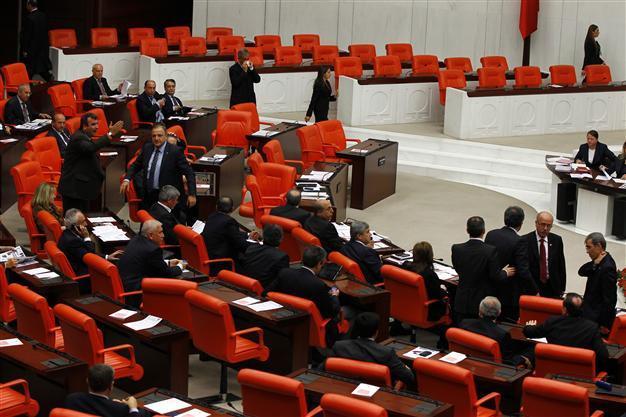Judiciary reform bid sparks controversy
ANKARA

AA Photo
Turkey’s fourth judicial package hits Parliament amid growing controversy and disappointment as many expect it will fail to meet expectationshe long-awaited fourth judicial package sparked controversy when it arrived in Parliament on March 7, but is not likely to satisfy the high expectations that have built up over time in its current state, particularly concerning the situation of convicts charged with membership to a terrorist organization.
The package’s main amendments relate to creating propaganda for terrorism and terror organizations and the package does not currently allow for the release of detainees in cases concerning the Kurdistan Communities Union (KCK), the alleged urban wing of the outlawed Kurdistan Workers’ Party (PKK), as their cases relate more to charges of membership in a terrorist organization rather than propaganda charges.
There is also no amendment in the package that might positively influence the situation of detained lawmakers, an issue that has concerned all three opposition parties as they each have at least one lawmaker behind bars.
Nonetheless, this is not the final phase for the 21-article package and it may well be changed in line with expectations at the commission-level debates by motions from the ruling Justice and Development Party (AKP). Future actions by the ruling party concerning the package are seen to be related to the resolution process, since it is assumed that the government might use the issue as a bargaining tool during the resolution process.
Apparently aware of such assumptions, AKP Deputy Chair and Spokesperson Hüseyin Çelik, told a press conference, didn’t wait for reporters’ questions in order to once more make it clear that the package is not at all related to the process, which aims to end conflict between security forces and the PKK.
Articles 6 and 7 of the Anti-Terror Law (TMK) and Article 220/8 of the Turkish Penal Code (TCK), which are all related to creating propaganda for terrorism and terror organizations, were amended in a way that limits the scope of propaganda crime. Yet, amendments are not sufficient for the release of KCK convicts.
Human rights defenders as well as executives from the Peace and Democracy Party (BDP) have argued that most of the detainees in the KCK case were arrested because they expressed dissenting opinions or attended demonstrations. The BDP maintains that there is no charge of violence against them.
A considerable number of KCK case detainees are also members of the BDP. While noting their law commission was still examining the package, BDP deputy Parliamentary Group Chair İdris Baluken didn’t hide his disappointment.
“Before everything else, Article 314 of the Turkish Penal Code [concerning membership of an armed organization] is not mentioned at all. Most of our friends in jail are being tried with reference to this article,” Baluken said. The BDP’s Şırnak deputy, Hasip Kaplan, was harsher in his criticism of the judicial reforms package. “This package, which has been much advertised, is empty.”
‘No contribution’
Instead of expanding freedom of expression, the package brings heavier clauses to limit this freedom, Kaplan said. “In its current form, the package does not make any contribution to this process and, furthermore is introducing new penalties that would lead to completely forbidding politics,” he said.
If the reform package is adopted there will no longer be a statute of limitations for crimes of torture.
The package also includes an amendment that anticipates the retrial for cases subjected to examination by the Committee of Ministers of the Council of Europe since June, 15, 2012.
















